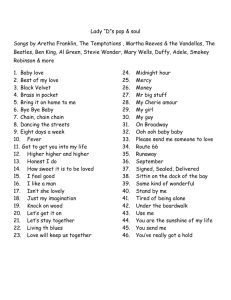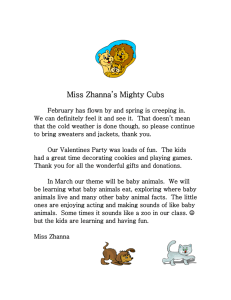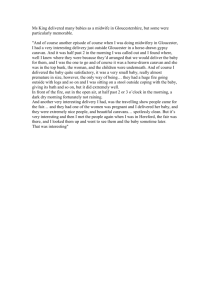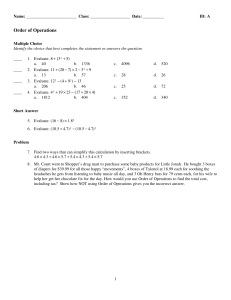Well child care at 2 months - Ad
advertisement
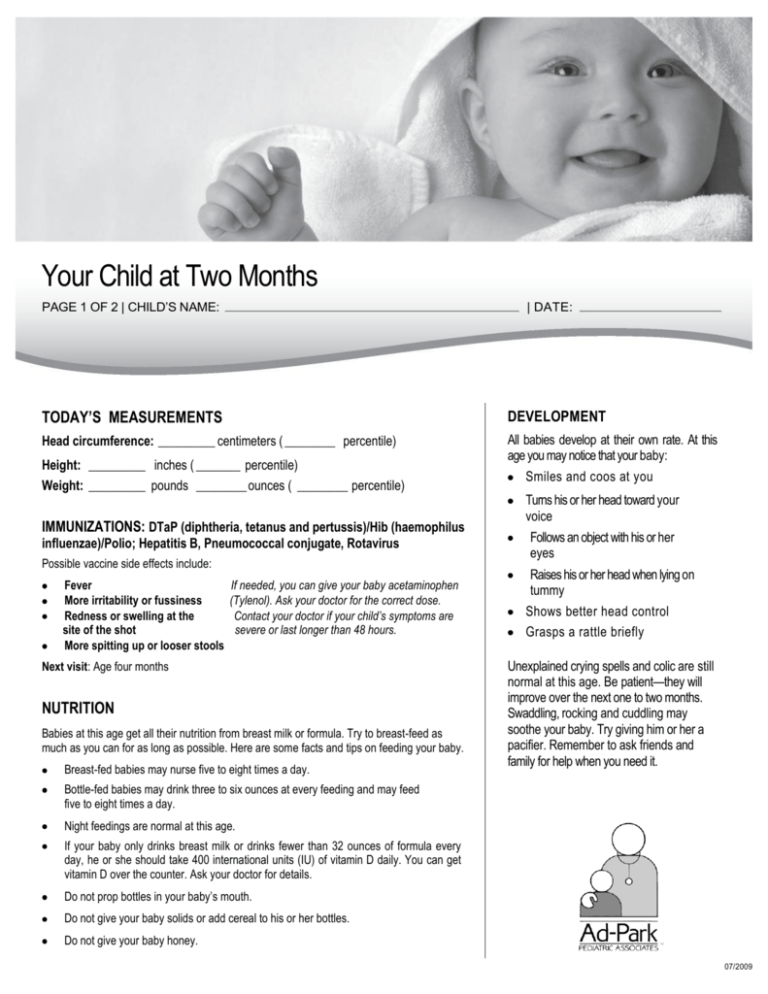
Your Child at Two Months PAGE 1 OF 2 | CHILD’S NAME: | DATE: TODAY’S MEASUREMENTS DEVELOPMENT Head circumference: _________ centimeters ( ________ percentile) All babies develop at their own rate. At this age you may notice that your baby: Height: _________ inches ( _______ percentile) Weight: _________ pounds ________ ounces ( ________ percentile) IMMUNIZATIONS: DTaP (diphtheria, tetanus and pertussis)/Hib (haemophilus influenzae)/Polio; Hepatitis B, Pneumococcal conjugate, Rotavirus Possible vaccine side effects include: Fever More irritability or fussiness Redness or swelling at the site of the shot More spitting up or looser stools If needed, you can give your baby acetaminophen (Tylenol). Ask your doctor for the correct dose. Contact your doctor if your child’s symptoms are severe or last longer than 48 hours. Next visit: Age four months NUTRITION Babies at this age get all their nutrition from breast milk or formula. Try to breast-feed as much as you can for as long as possible. Here are some facts and tips on feeding your baby. Breast-fed babies may nurse five to eight times a day. Smiles and coos at you Turns his or her head toward your voice Follows an object with his or her eyes Raises his or her head when lying on tummy Shows better head control Grasps a rattle briefly Unexplained crying spells and colic are still normal at this age. Be patient—they will improve over the next one to two months. Swaddling, rocking and cuddling may soothe your baby. Try giving him or her a pacifier. Remember to ask friends and family for help when you need it. Bottle-fed babies may drink three to six ounces at every feeding and may feed five to eight times a day. Night feedings are normal at this age. If your baby only drinks breast milk or drinks fewer than 32 ounces of formula every day, he or she should take 400 international units (IU) of vitamin D daily. You can get vitamin D over the counter. Ask your doctor for details. Do not prop bottles in your baby’s mouth. Do not give your baby solids or add cereal to his or her bottles. Do not give your baby honey. 07/2009 Your Child at Two Months PAGE 2 OF 2 SAFETY Never shake your baby. Set your water heater to 120 degrees Fahrenheit so you won’t burn your baby. Always put your baby to sleep on his or her back. Babies should sleep on a firm mattress covered with a fitted sheet. Keep pillows, bumpers, blankets and toys away from your baby while he or she sleeps. Always place your baby in a car seat that faces backward in the back seat. For more information on car seats or to find a car seat inspection office in your area, go to the National Highway Traffic Safety Administration Web site: nhtsa.gov. Never leave your baby alone in a car or a bath or on high surfaces. Do not cook or drink hot liquids while holding your baby. PROMOTING DEVELOPMENT Talk, read and sing to your baby. Play music for your baby. Hold and cuddle your baby often. Place your baby on his or her tummy during playtime. Create a regular bedtime routine. Do not let your baby watch TV or baby videos. WHEN TO CALL YOUR DOCTOR’S OFFICE Call your doctor if you have questions about your baby or if he or she: Do not let people smoke around your baby. Has a rectal temperature of 100.4 degrees or higher Never tie a pacifier or put jewelry around your baby’s neck. Cries a lot more than normal or can’t be comforted Make sure that your baby’s toys do not have sharp edges and can’t be broken. The toys should be at least one and a half inches wide—your baby could choke on them if they are smaller than that. Keep balloons and plastic bags away from your baby—they are dangerous and can suffocate your child. Has trouble breathing Make sure that the smoke and carbon monoxide detectors in your home are working. If you are worried about violence in your home, please speak with your doctor or contact the National Domestic Violence Hotline at 1-800-799-SAFE (1-800-799-7233) or ndvh.org. Post the Poison Control Hotline on your refrigerator 1-800-2221222. FOCUS ON FAMILY Postpartum depression can happen at any time during the first year. While postpartum blues are common during the first few weeks, they usually get better. If moms feel sad, anxious or depressed beyond this time, they should seek help and talk with their doctor. You can find more information online at postpartum.net. Older brothers and sisters may feel jealous of the new baby. Spending time alone with your older children may help. Try to find time for you and your partner to be alone. Taking care of yourselves will allow you to take better care of your family. Is limp or sluggish ADDITIONAL RESOURCES American Academy of Pediatrics: aap.org; American Academy of Family Physicians: aafp.org; Immunization information: immunize.org, cdc.gov/vaccines, vaccine.chop.edu, familydoctor.org and vaccineinformation.org Suggested reading: Baby 411: Clear Answers & Smart Advice for Your Baby’s First Year by Ari Brown, M.D., and Denise Fields Caring for Your Baby and Young Child: Birth to Age Five by American Academy of Pediatrics, Stephen Shelov, M.D. The Happiest Baby on the Block by Harvey Karp Healthy Sleep Habits, Happy Child by Marc Weissbluth Infants and Mothers: Differences in Development by T. Berry Brazelton, M.D. What to Expect the First Year by H. Mukoff Your Baby and Child: From Birth to Age Five by Penelope Leach Mother Nurture by Rick Hanson, Jan Hanson and Ricki Pollycove Other books are available at aap.org/bookstore.



